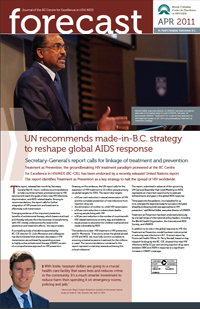UN recommends made-in-BC strategy to reshape global AIDS response
Secretary-General’s report calls for linkage of treatment and prevention
 Treatment as Prevention, the groundbreaking HIV treatment paradigm pioneered at the BC Centre for Excellence in HIV/AIDS (BC-CfE), has been endorsed by a recently released United Nations report. The report identifies Treatment as Prevention as a key strategy to halt the spread of HIV worldwide.
Treatment as Prevention, the groundbreaking HIV treatment paradigm pioneered at the BC Centre for Excellence in HIV/AIDS (BC-CfE), has been endorsed by a recently released United Nations report. The report identifies Treatment as Prevention as a key strategy to halt the spread of HIV worldwide.
The report, released last month by Secretary-General Ban Ki-moon, outlines recommendations to help countries achieve universal access to HIV services and reach the goals of zero new HIV infections, discrimination, and AIDS-related deaths. Among its recommendations, the report calls for further integration of HIV prevention and treatment to effectively curb transmission.
“Emerging evidence of the important prevention benefits of antiretroviral therapy, which lowers viral load and thereby reduces the infectiousness of people living with HIV, merely underscores the need to link prevention and treatment efforts,” the report states.
A compelling body of evidence assembled by BC-CfE director Dr. Julio Montaner and colleagues has demonstrated that dramatic decreases in HIV transmission are achieved by expanding access to highly active antiretroviral therapy (HAART) as part of a comprehensive approach to HIV prevention.
Drawing on this evidence, the UN report calls for the expansion of HIV treatment to 13 million people among six global targets for 2015. The report also targets:
- a 50 per cent reduction in sexual transmission of HIV and the complete prevention of new infections from injection drug use
- the elimination of mother-to-child HIV transmission
- a 50 per cent reduction in tuberculosis deaths among people living with HIV
- a 50 per cent reduction in the number of countries with HIV-related restrictions on entry, stay, and residence
- equal access to education for children orphaned and made vulnerable by AIDS
“The evidence is clear: HIV treatment is HIV prevention,” said Dr. Montaner. “If we are to arrest the global spread of HIV and AIDS, we must fully commit ourselves to ensuring universal access to treatment for the millions in need. The recommendations contained in this report represent a vital step towards achieving this critical milestone.”
The report, submitted in advance of the upcoming UN General Assembly High Level Meeting on AIDS, represents an important opportunity to evaluate achievements and gaps in the global AIDS response.
“Thirty years into the epidemic, it is imperative for us to re-energize the response today for success in the years ahead by embracing bold new approaches to HIV prevention,” said Michel Sidibé, executive director of UNAIDS.
Treatment as Prevention has been endorsed previously by a broad range of international policy leaders, including the World Health Organization, the International AIDS Society, and UNAIDS.
In addition to its role in the global response to HIV, the Treatment as Prevention model has been instrumental in reducing new infections in B.C. A recent report by Provincial Health Officer Dr. Perry Kendall, based on key research findings by the BC-CfE, showed that new HIV infections fell by 52 per cent among injection drug users between 1996 and 2009 in response to a significant increase in HAART coverage.
